Dehydrating Ginger and Make Ginger Powder
Today it’s all about ginger powder and how to make it and use it. You will love this! My house smells so awesome with my ginger dehydrating.
Ginger has a bit of a spicy flavor and has some very good health benefits, I’ll show you below. The first step is to dehydrate the peeled and sliced fresh ginger.
Ginger Powder-How To Make It
Step One
Typically when I buy a ginger root I place it in the freezer and peel a section and grate it when I want to use it. But you really want to get a fresh root to get all the freshness in the ginger root when dehydrating it and making ginger powder.
The first thing you do is wash it and make sure any dirt is removed. I try to buy larger roots so they are easier to peel either with a peeler or a paring knife. I used a paring knife today.
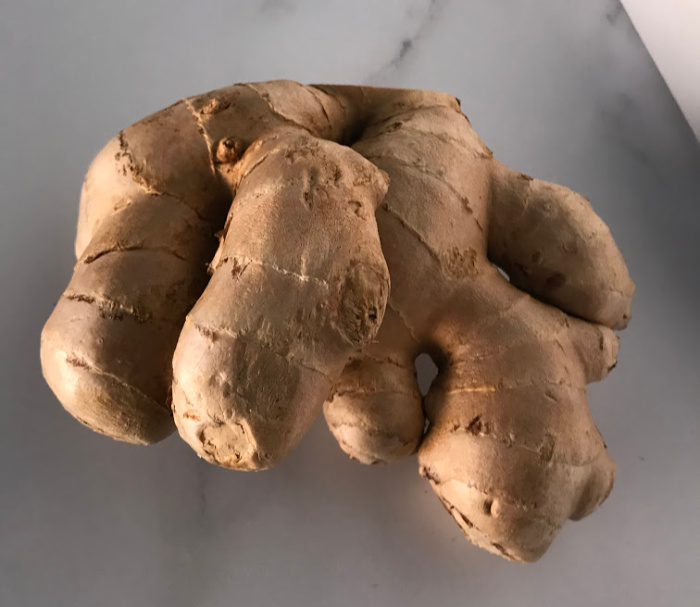
Step Two
I sliced my ginger root about 1/8 inch thick and I tried to cut them as evenly as I could. They are never going to be exactly perfect because the roots are all different sizes.
You can’t make a mistake, you just dry the larger ones a bit more if they are not totally dry. I have an Excalibur Dehydrator and I set it at 95 degrees and it took about 2 hours, give or take.
Mine has a timer and I set it for two hours, then I checked it. Well, I actually checked it after one hour to be sure it was drying as I had planned.
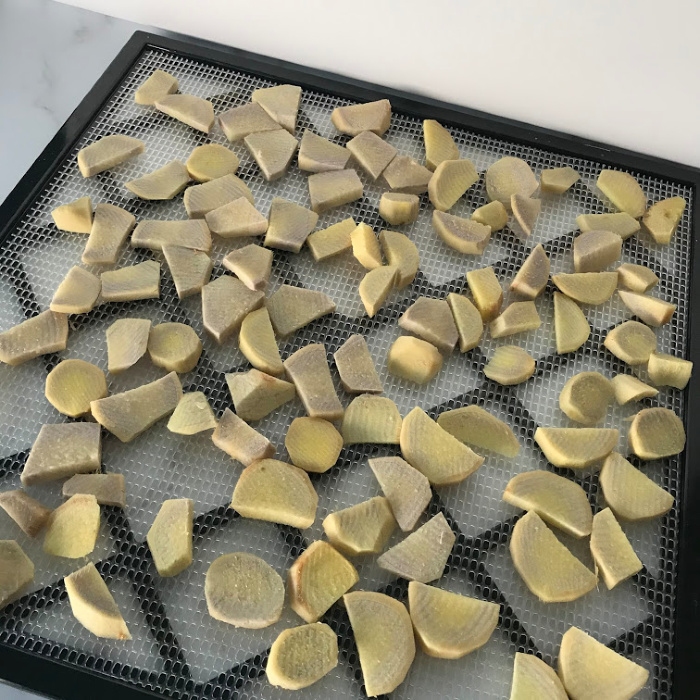
Step Three
The trick to knowing if the ginger is finished drying is to test the chunks of ginger. If they break easily they are ready to cool and set aside to make into powder.
How To Condition Your Fruit or Vegetables
If you live where it is HUMID: “To condition the fruit, take the dried fruit that has cooled and pack it loosely in plastic or glass jars. Seal the containers and let them stand for 7 to 10 days. The excess moisture in some pieces will be absorbed by the drier pieces. Shake the jars daily to separate the pieces and check the moisture condensation.” https://nchfp.uga.edu/how/dry/pack_store.html
I live in the DRY DESERT: I set my fruit and vegetables on my countertop for 5-7 days. Ten days is even better to make sure everything is dry before using your FoodSaver unit.
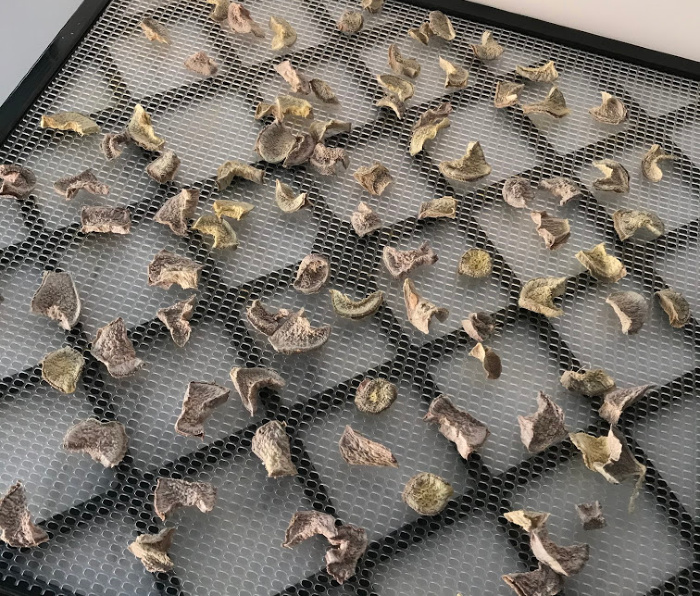
Step Four
I used my Magic Bullet to grind my ginger root into powder. It was easy and turned out perfectly for my next drink or recipe. You could use your blender as well, either one will work.
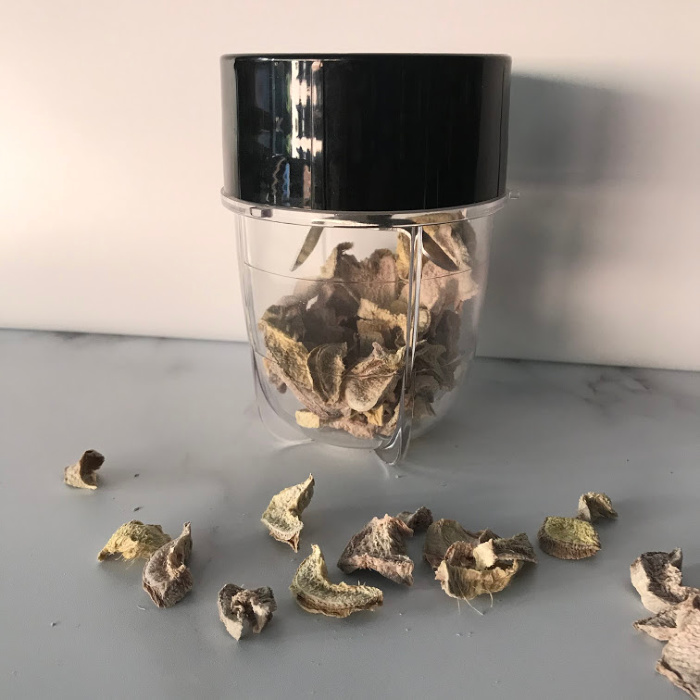
Step Five
The best thing to do is to grind only what you will use in the next month or so. I like fresh, oh my gosh, is it ever fresh.
You will never be able to go back to those jars at the grocery store ever again. I wish you could smell it and taste it!
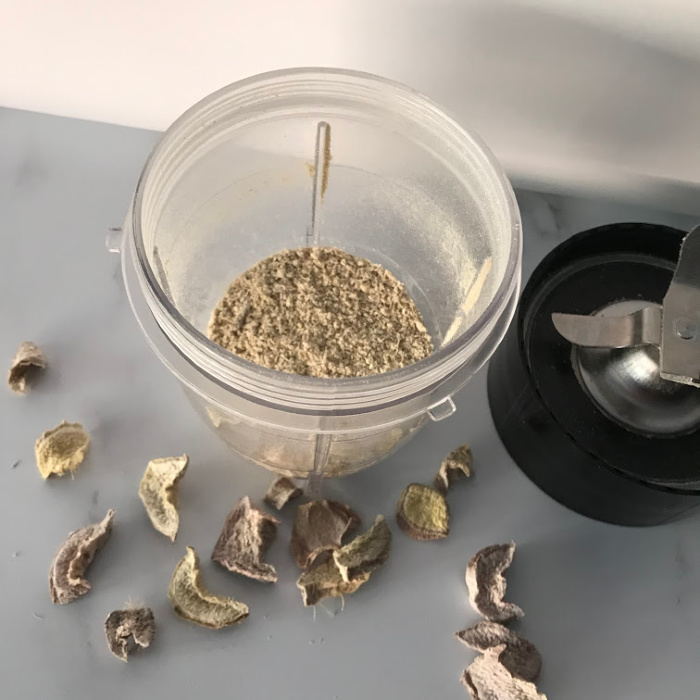
Step Six
I store my ground ginger in jars like you see below, or in small 1/2 pint mason jars with those Ball white lids I have shown you before.
Please do not use your FoodSaver with the accessory hose with this product, it will ruin the machine. Just a word of caution, my friends.
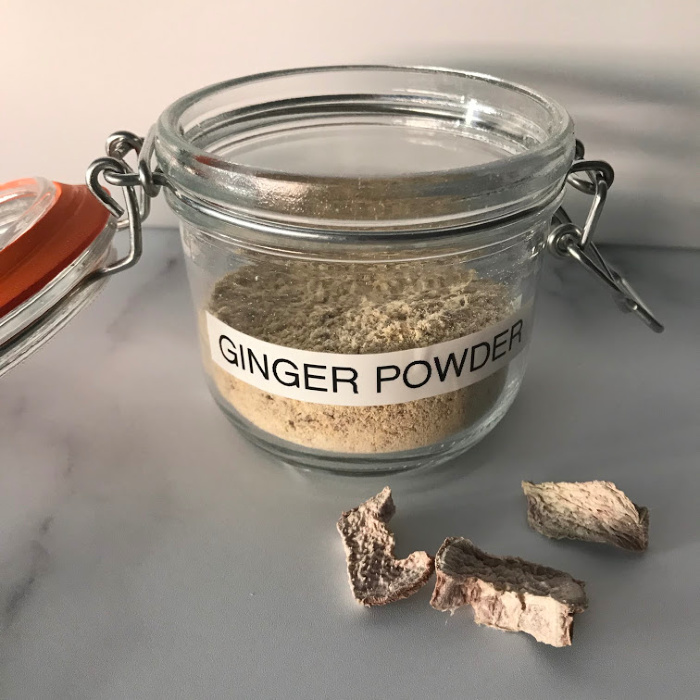
Finished Product
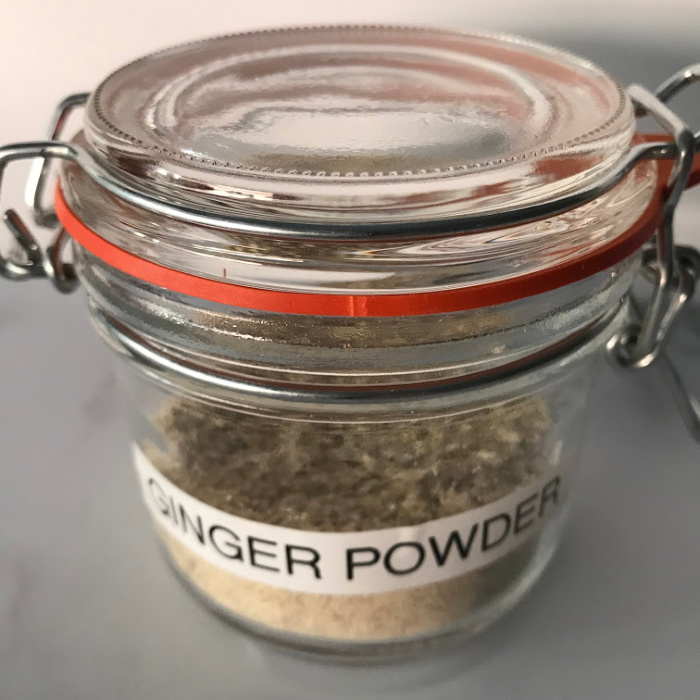
Health Benefits of Ginger Root
I’ve mentioned many times before, I’m certainly not a medical expert or trained to advise others regarding medical treatments. What I have tried to do is share what I’ve learned from my research and personal experience, particularly when it comes to using “natural” remedies.
Ginger isn’t a natural food that will cure specific diseases. If you plan to use ginger as a form of medical treatment, I suggest you talk with your doctor first.
From my reading, I’ve learned that ginger in its many forms is particularly good at treating nausea / upset stomach. You may find it helps with seasickness, morning sickness, or the challenges you have with other medications after surgery or chemo.
Ginger has a chemical called gingerol that has been found to reduce inflammation and the related effects of muscle pain and soreness. Although a good pain reliever, get to your doctor if pains persist more than a few days.
Anti-Inflammatory Benefits
Probably because of the anti-inflammatory benefits of ginger, it has also been widely used to fight the effects of arthritis, particularly with women who suffer from osteoarthritis.
I struggle every day with arthritis, especially in my hands. Ginger has provided some relief, especially on bad days. The anti-inflammatory nature of ginger also seems to promote positive brain activity, particularly in older people.
Some studies have shown that ginger can help prevent heart disease. It may be as a result of the ability ginger has to reduce the effects the bad cholesterol has on our circulatory system, much like omega-3 fatty acid foods do.
Some studies show that certain people tend to bleed more easily if on a ginger regimen, so if you notice this particular side effect you should stop using ginger, or reduce the amount you ingest each day.
Ginger has been shown to reduce the incidents of certain cancers, such as colon cancer. Ginger seems to promote healthy digestion and prompts foods to pass through our bodies more quickly, thus putting less strain on the colon.
Finally, ginger has been shown to reduce the effects of infection throughout our bodies, something we can all be grateful for.
How Do I Use Ginger Powder?
Ginger can be used in so many foods and drinks. It adds a special flavor to drinks, baked treats like cookies, on some meats, especially fish. Feel free to add them to your daily smoothie for a unique flavor adventure.
Is it a blood thinner?
As I mentioned above, some people seem to be more prone to bleeding if using ginger on a regular basis. Discontinue its use if this becomes an issue, and particularly when you are on blood-thinning medications as directed by your doctor.
Is Ginger bad for our Kidneys?
No relationship has been found with the use of ginger and any kidney damage. Actually, there have been studies that seem to show ginger has reduced the effects of diabetes on the kidneys.
Again, consult your doctor before using ginger or any other natural herbs to achieve desirable health benefits.
What happens if I consume it every day?
Although some people have reported side effects from using ginger, like its effects on sensitive skin for some, and nausea experienced by others, ginger can be used each day by most people as long as it is used in moderation.
How much Ginger can I consume each day?
It has been suggested that most of us should limit intake to 4 grams per day, or only 1 gram daily if pregnant.
Can it affect your heart?
As mentioned above, ginger has been shown to have reduced heart disease in many individuals. Consult your doctor if you feel more guidance is needed to correct any particular issues with your current heart conditions.
Can I Dehydrate It In My Oven?
Yes, you can. Just place a chunk of foil in the door to keep it open because we need the ginger to dry at the very lowest temperature. Just make sure you keep watching it because it will dry faster than you may think.
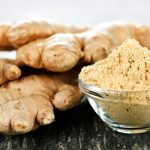
- Fresh Ginger
-
Buy larger pieces of ginger so they are easier to peel. Wash, the ginger and pat dry. I sliced my ginger root about 1/8 inch thick and I tried to cut them as evenly as I could. They are never going to be exactly perfect because the roots are all different sizes.
You can’t make a mistake, you just dry the larger ones a bit more if they are not totally dry. I have an Excalibur Dehydrator and I set it at 95 degrees and it took about 2 hours, give or take.
Mine has a timer and I set it for two hours, then I checked it. Well, I actually checked it after one hour to be sure it was drying as I had planned. The trick to knowing if the ginger is finished drying is to test the chunks of ginger. If they break easily they are ready to cool and set aside to make into powder.
-
Use your blender to pulverize the dehydrated ginger.
Hot and Spicey Drink
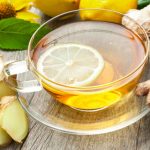
- 6 cups water
- 1/4 cup sliced ginger root
- 1 cup brown sugar
- 2 tablespoons raw honey
- 4-6 slices of fresh lemon
-
Bring the water to a boil with the sliced ginger root. Add the brown sugar, and honey, simmer until the sugar and honey have dissolved. You're going to want to strain the drink to remove the bits of ginger left in the pan. Serve with a lemon slice, enjoy.
Here are the other Dehydrating Posts I have done:
- Dehydrating Apples
- Dehydrating Bananas
- Dehydrating Blackberries and Powder
- Dehydrating Blueberries and Powder
- Dehydrating Cilantro
- Dehydrating Cucumbers and Powder
- Dehydrating Ginger and Powder
- Dehydrating Green Onions and Powder
- Dehydrating Kale and Kale Powder
- Dehydrating Kiwi
- Dehydrating Lemons and Powder
- Dehydrating Marshmallows
- Dehydrating Peppermint Marshmallows and Powder
- Dehydrating Mushrooms and Mushroom Powder
- Dehydrating Onions and Powder
- Dehydrating Pears
- Dehydrating Pineapple
- Dehydrating Raspberries and Powder
- Dehydrating Spinach and Powder
- Dehydrating Strawberries
- Dehydrating Tomatoes and Powder
- Dehydrating Watermelon
Final Word
As always, I’m trying to teach the world to be self-reliant. Dehydrating is one more step to preserving our food in a self-reliant world. We can do this, my friends.
It’s easy to dehydrate just about anything. This is part of my ongoing dehydrating series. Stay well, stay safe, and keep prepping. May God bless this world, Linda

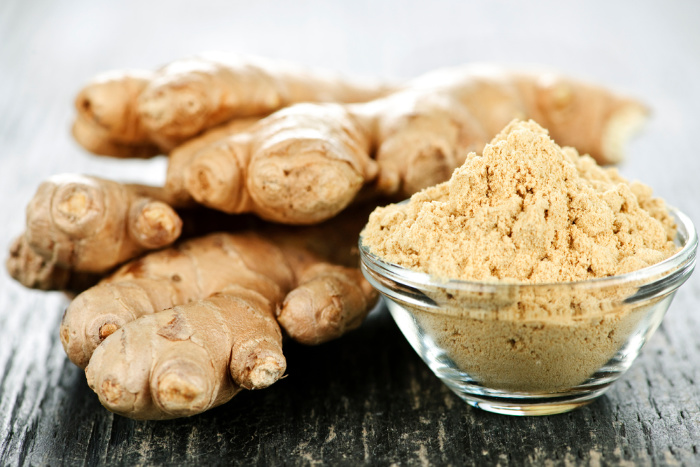

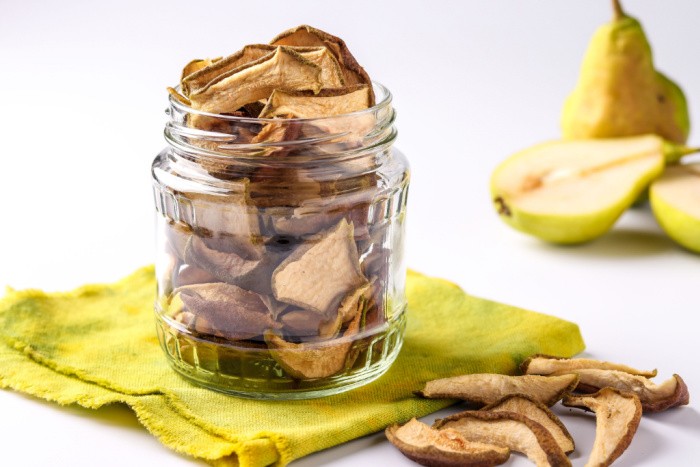
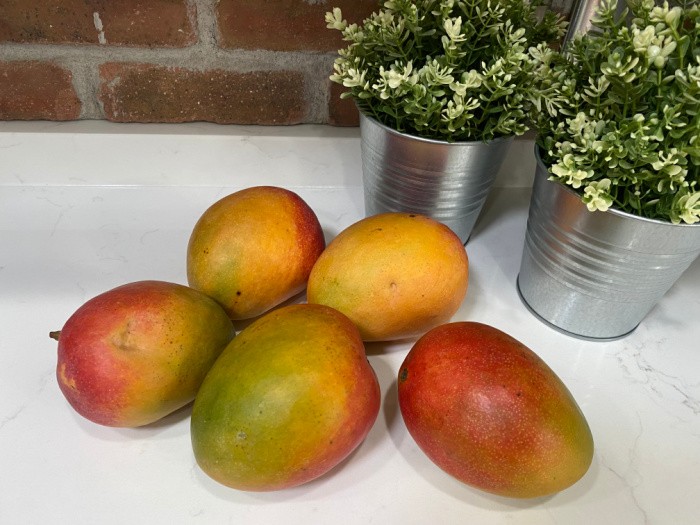
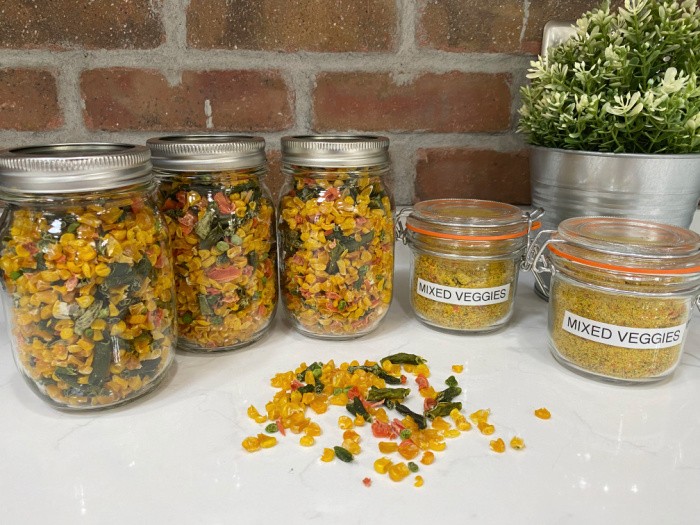
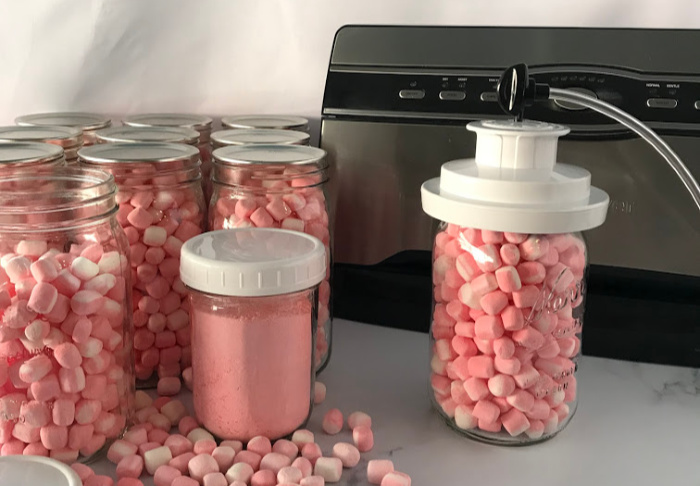
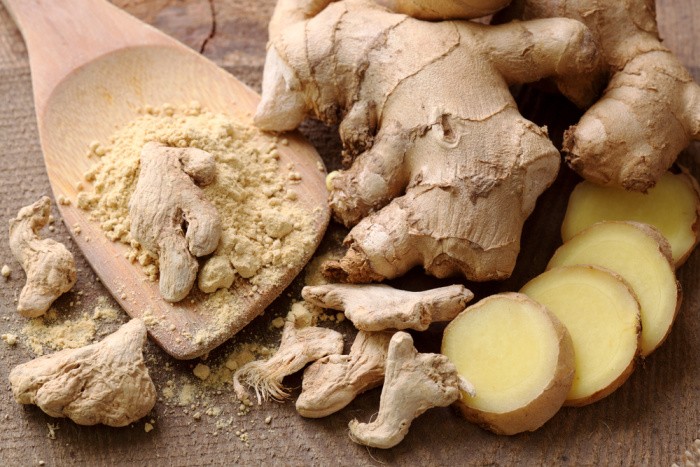
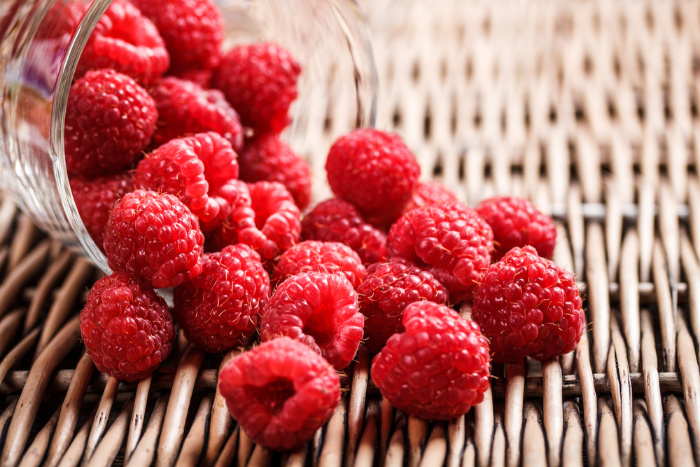

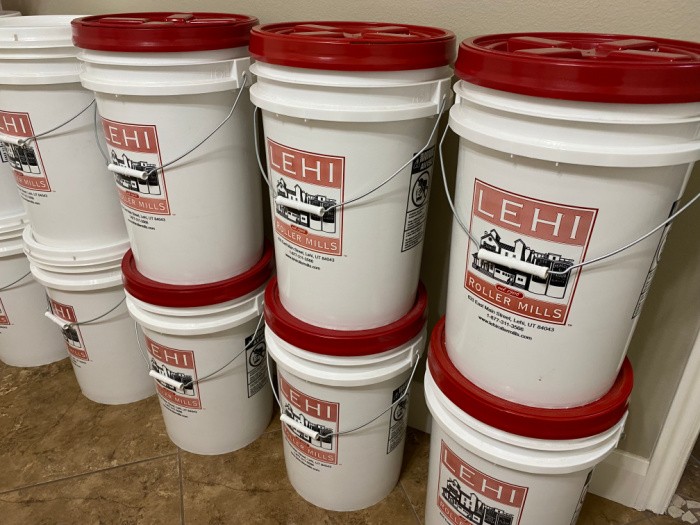
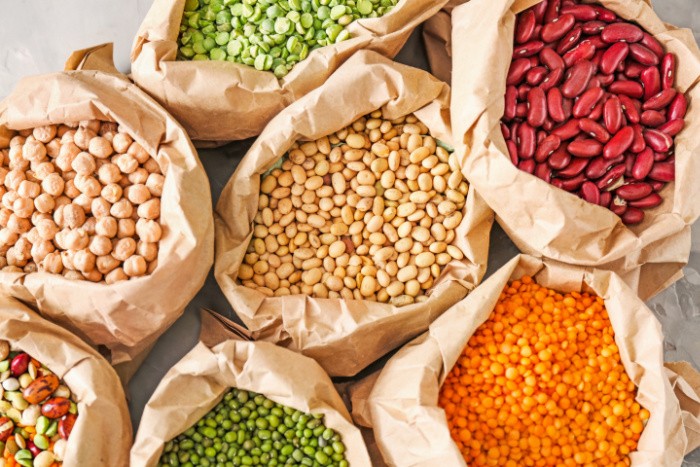


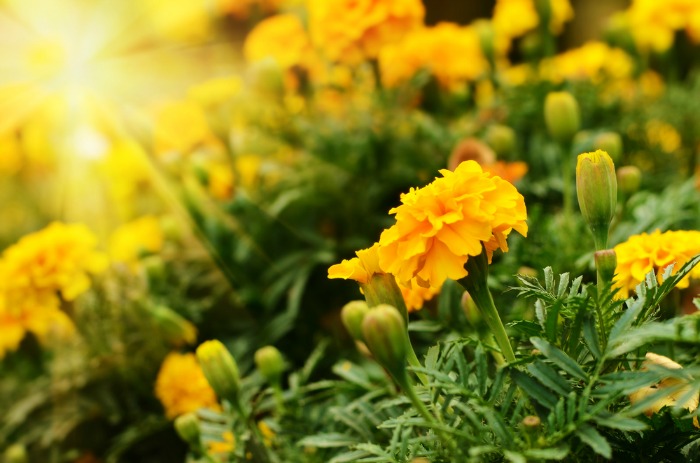
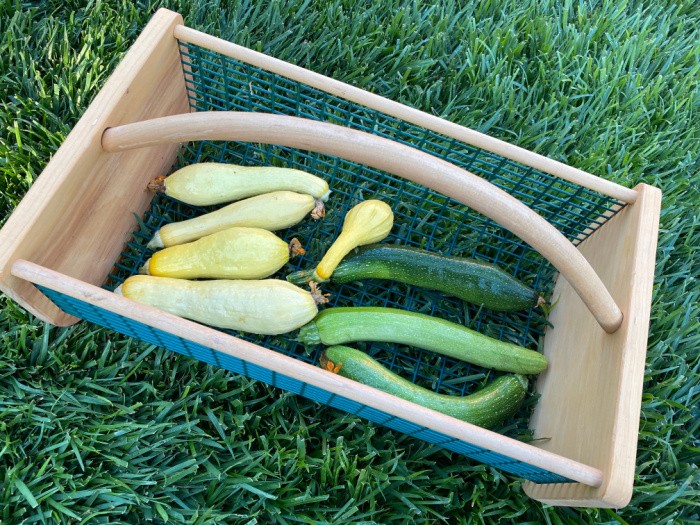

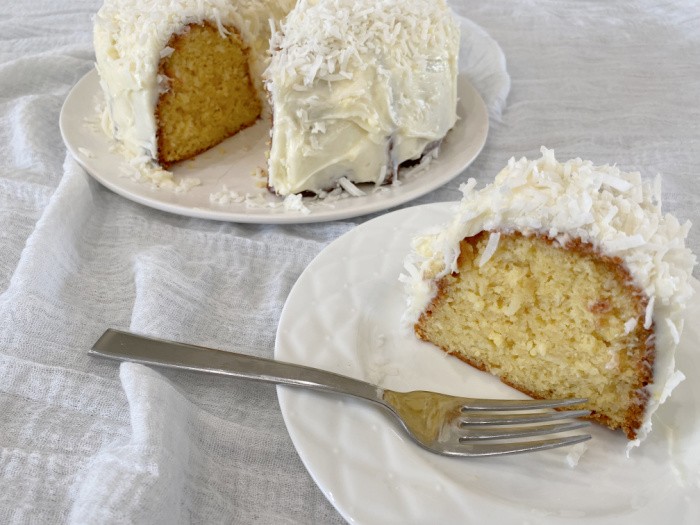
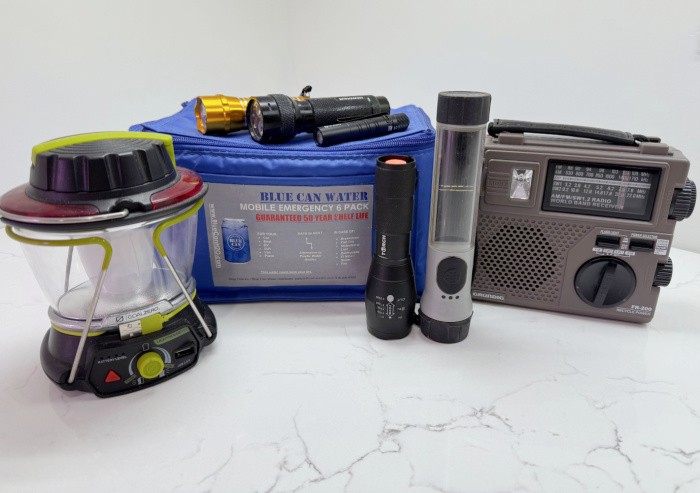
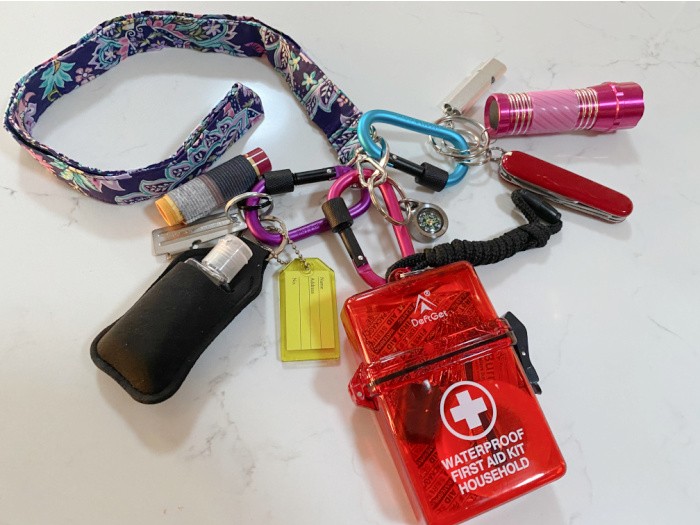


I’ve never powdered my dried ginger but I do use it all winter long. It has a warming affect and on those days that I feel particularly chilled, a simple ginger tea is all it takes to warm me up. I do believe it is the ginger and not just the “hot tea” as I have tried regular herbal and black teas but did not get the same feeling of warmth.
I also make a tea with honey, lemon and ginger to ward off sore throats and ease the symptoms of a cold. In fact, each fall, I make a concoction of this to have on hand. What I do (I live alone) is take a pint jar – to this jar, I add thinly sliced organic lemon (I don’t pack the slices in but I do fill the jar) and minced ginger (about a 2 inch chunk – or I suppose one could add some of the ginger powder!). Once I have all the lemon and ginger in the jar, I fill it with raw local honey. I use a chopstick to insure that the honey is all through and no air bubbles – this may take a while so I fill the jar, let it sit for a couple of hours, then come back to it and sort of stir it up again, adding more honey if necessary.
If the lemon and ginger are completely submerged in the honey, there should be no problem leaving it out on the counter all winter (or until it is gone!) because honey, if it is raw, is antibacterial and antifungal. The honey should become very liquid and periodically I do stir it around to make sure everything is submerged. I have also strained the honey after a couple of weeks of steeping and stored it in the fridge but it will crystalize, making it more difficult to spoon it out of the jar – if doing this, make sure the jar is a wide mouth.
When I feel a sore throat or cold coming on, I do one of 2 things: 1) take a teaspoon (not a measuring spoon) and simply swallow it – I do this several times a day; or 2) make a warm tea with the honey. One more thing about making a tea from this honey – don’t use boiling water. I simply want the water warm. If the water is too hot, it negates the health properties of the raw honey.
Lastly, as I use my honey/lemon/ginger, I continue to add more honey to the jar. If it starts to get weak tasting, I will add fresh lemon and ginger. I swear by this!
As with any honey, however, do not give this to children under the age of one. Also, if you have an aversion to chunks of ginger in your tea, you can pick or strain those out.
Hi Leanne, oh my gosh, I LOVE this! I never made it in a wide mouth jar, I will now! Great tip!! Linda
Oh my, this sounds goooooood! Going to get some fresh ginger and set this up (as soon as the ice is gone, tomorrow, I hope…)
Hi Rhonda, yay!! Linda
Great idea, Linda. I love ginger, and normally peel, chop and freeze it flat in a Ziploc bag. The powdered one I bought tastes horrible, so I will try your method next time. I get ocular migraines occasionally, and if I drink 1/4-1/2 teaspoon powdered ginger in a cup of water right away, it stops immediately.
Hi Roxanne, WHAT? Oh my gosh, I love this! Not your horrible headaches, of course. But adding some ginger powder to a cup of water will stock your bad headaches! Thank you!! Linda
Ginger root is easier to peel using a teaspoon
Hi Susan, oh my gosh, I love hearing this! I will try using a spoon next time!! Linda
Re. ginger as a remedy. I started my DH on ginger–powder, in capsules I fill myself. He’d been having heartburn/reflux, for which his drug-pushing doctor had put him on Omeprazole, for several years (which was probably what started his memory loss–and he *still* had reflux). Ginger twice a day, plus home-made meadowsweet glycerite for very occasional heartburn, cured the reflux that omeprazole didn’t fix. (I’ve had to give omeprazole to horses for ulcers–generally accepted that you don’t give it for more than 2-4 weeks… With DH it was at least 3 years…)
Peeling ginger. I’ve tried several ways. Scraping with a plain ol’ spoon seems to work best for me! Easier than a vegetable peeler, safer than a knife, less waste. Also, I save the scrapings in a bag in the freezer, and use those for tea. Takes more than if you used actual chopped ginger, but waste not, want not. (Of course if you plan to use the scrapings you need to wash the roots thoroughly first.)
I haven’t tried it yet, but plan to–supposed to be able to use a bit of root and grow a whole new plant in a pot, then harvest the roots and begin again. Same for turmeric, apparently. Anyone tried this?
Hi Rhonda, I haven’t, let’s see if anyone has been able to grow it from the root. Linda